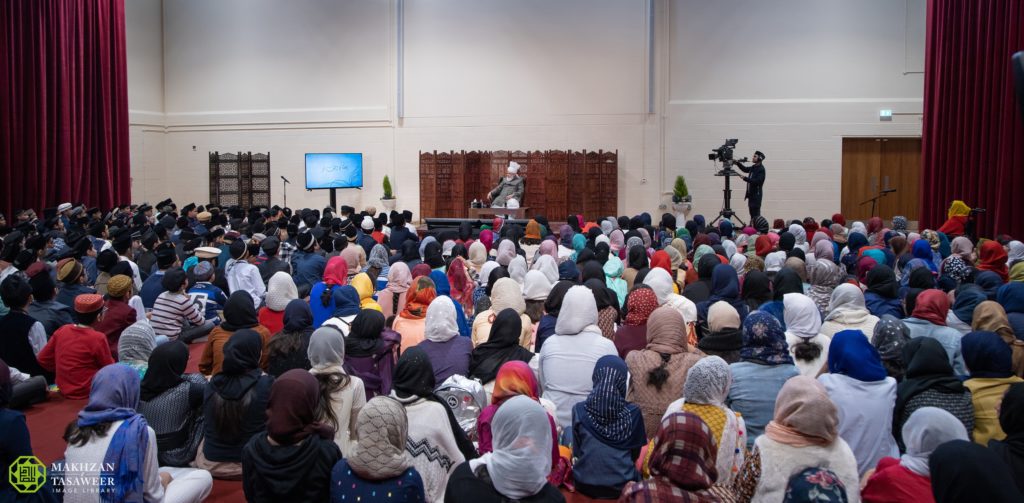
On 19 January, a group of approximately 600 young Waqifeen-e-Nau and Waqifaat-e-Nau from the UK had a sitting with Hazrat Khalifatul Masih V, may Allah be his Helper.
Al Hakam’s correspondent spoke with the National Waqf-e-Nau team about the event and how it came about. They told us, “In the beginning of December, when the office had its first refresher course for national secretaries, Hazrat Khalifatul Masihaa guided the team and said that the Waqf-e-Nau classes ought to be conducted in January and February and held in the Masroor Hall in Islamabad as it is suitable and can accommodate a larger number of individuals.”
The class commenced with the recitation of the Holy Quran, followed by hadith and a choral poem. Thereafter, a speech was delivered on the responsibilities of belonging to the Waqfe-Nau scheme, along with quotes and advice given by Huzooraa on what it means to be a true Waqf-e-Nau.
Further, alluding to the Friday Sermon that Hazrat Amirul Momineenaa delivered in Canada on 28 October 2016, Waqifeen expressed the inner transformation they made within themselves and how they have inculcated Huzoor’saa words and advice into their lives. After this, the Waqifeen had the opportunity to ask Huzooraa numerous questions.
The first question was presented by a young girl who asked Huzooraa if he ever felt worried or stressed and how Huzooraa handled such situations. In response, Huzooraa said, “I pray to Allah that He helps me and removes all my difficulties and problems.”
A young child then asked whether God still speaks to us. Answering the young child, Huzooraa stated, “God speaks, but He has different ways in which He speaks to man.”
Huzooraa further added that God speaks to man through dreams, angels, revelations etc. He said that God is not a physical being, but He is Nur (light) and He has His different ways in which he communicates with man.
A question was asked about the black stone, known as Hajr-e-Aswad; where it came from and why pilgrims kiss it. Huzooraa explained that it is often described as a meteorite that fell from the sky. The stone was placed on the Ka‘bah’s wall, which symbolises that the tawaf (circumambulation) of the Ka‘bah starts and begin from here. Regarding pilgrims kissing the stone, Huzooraa explained that it is recorded that the Holy Prophet, peace and blessings of Allah be upon him, kissed the stone when starting the circuit of the Ka‘bah. Huzooraa further added that the stone does not have any significance itself and mentioned the hadith where it is narrated that once, Hazrat Umar, may Allah be pleased with him, was seen kissing the stone and said, “No doubt, I know that you are a stone and can neither harm anyone, nor benefit anyone. Had I not seen Allah’s Messenger [Muhammadsa] kissing you, I would not have kissed you.”
A question was asked to Huzooraa about whether he was aware that he would become the Khalifa and if he received any sign from God that he would become the Khalifa. Answering the young boy, Huzooraa said, “No. Neither was I aware when I was young, nor old, nor on the day that I was elected.”
Talking about the status between prophets and angels, one Waqf-e-Nau boy asked whose status was higher, the Promised Messiah’sas or angels. Huzooraa answered by quoting a couplet of a famous Urdu poet. The meaning of the couplet was that man has the ability to achieve a higher status than angels, but the endeavour is far greater. Huzooraa further added, “The status of all prophets that have walked the earth is higher than the status of the angels”.
A young Waqf-e-Nau child asked Huzooraa what the best advice was that his mother had given. Huzooraa said, “To speak the truth and never lie.” Huzooraa further added that once a person asked the Holy Prophetsa to tell him one bad deed he should refrain from and by doing so, would make him a better person. Upon this, the Holy Prophetsa said to the man that he should refrain from lying. By doing this, the man was able to break bad habits and other vices which he would have otherwise committed.
A young girl, who completed the recitation of the Holy Quran at the age of ten, expressed to Hazrat Khalifatul Masihaa that she had not had her Amin ceremony. Upon this, Huzooraa replied, “You may come with your family to my office and have your Amin there.”
A question was asked about what Waqf-e-Nau children should do if a world war breaks out. Huzooraa said, “You should pray that God guides the leaders of those countries that are on the brink of war.” Huzooraa further said that if the war does break out then “you should pray for minimal damage … at your age, you can only pray.”
A Waqf-e-Nau girl asked Huzooraa if she could be friends with atheists. In response, Huzooraa said, “If you feel that your faith in God is strong and you won’t waver, and you can bring the atheist towards God, then it is fine.” Huzooraa further added, “However, if you are in doubt that God exists, then it is possible that the atheists’ belief will influence you too.”
Huzooraa then went on to narrate a famous incident about a student who once approached the Promised Messiahas and said that his belief in God was wavering. Upon this, the Promised Messiahas told him to change his seat in college. When the student did this, his faith in God came back. When he told the Promised Messiahas about this, the Promised Messiahas explained to him that his friend who he used to sit next to in college was in fact an atheist and his character was having an influence over him.
Huzooraa then added, “Good friends will have a good influence and bad friends will have a negative influence over one’s character.”
With this the Bustan-e-Waqf-e-Nau class concluded.

